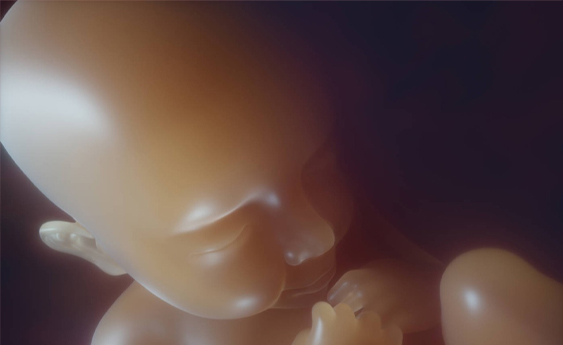NUTRITION
Choline Supplementation during Pregnancy Can Better Promote the Development of Fetal Brain and Nerve
Studies confirm that choline is an important substance for the development of baby’s brain tissue and nerve. Mothers should pay attention to the supplement of choline from the beginning of pregnancy to after the childbirth to provide adequate nutrition for brain and nerve development of the baby.
Modern medicine has proved that supplementing neuro developmental substances can help develop and enhance the functions of children’s brain neurons, and this process involves the formation of an important structure - myelin sheath, which cannot be separated from the support of choline and DHA. Compared with DHA, choline starts to play an important role in the fetal period. Many mothers only know about supplementing their children with DHA after delivery, but they don’t know the importance of choline supplementation during pregnancy.
Important substances for brain neuro-development during the fetal period
As a precursor of acetylcholine, choline can constitute a neurotransmitter and participate in information transmission. It is an indispensable nutrient for the development of brain tissue and nervous system [1-3]. Studies have found that choline supplementation in early pregnancy can reduce the occurrence of neural tube malformation in fetus [4], while choline supplementation in late pregnancy can promote the development of the hippocampal gyrus region of the brain [5], which ultimately improves the cognitive ability and memory ability of the offspring after birth [6-7]. Choline is therefore essential in the early stages of brain and neuro-development.
Food is an important source of choline during pregnancy
There are two sources of choline in the mother’s body; one can be synthesized by herself, and the other is through food intake. Food intake is a more important source. The choline in the fetus is mainly transferred from the mother to the fetus through the placenta, so the dietary choline intake of pregnant women is related to the fetal choline level. It has been reported in foreign literature that the choline level in fetal plasma and amniotic fluid is 3-10 times higher than that in pregnant women [8-9, 10]. Mothers of preterm infants have lower intakes during pregnancy than mothers of term infants [11]. Therefore, in order to increase the level of choline in the fetus, pregnant women need to take enough choline from the food themselves so as to provide adequate nutrition for the brain neurodevelopment of fetal.
Preterm infants need more choline supplementation
As rapid fetal brain and nervous system development take place during pregnancy and early postpartum periods, if the choline intake of mother is insufficient, irreversible changes in the child’s brain and nervous system will occur.
Especially for preterm infants, the time of preterm birth is just an important period of fetal brain development; at this time, the fetus needs to consume enough choline from the mother, but due to premature birth, the route of taking choline through the placenta is cut off. Studies have found that the cord blood choline level of preterm infants is significantly lower than that of term infants. Therefore, if the preterm infants cannot be supplemented in time, it will affect the development of brain, nerves and other body tissues.
Choline supplementation should be sufficient during pregnancy
Choline is so important to children that mothers must follow the advice to supplement sufficient choline. Studies have found that the daily choline intake of pregnant women is mostly lower than the recommended amount. According to the recommendations of reference intake of dietary nutrients for Chinese residents in 2013, the optimal intake of choline for pregnant women and those in lactation is 420 mg/d and 520 mg/d respectively [12]. In addition, some daily foods are rich in choline, such as eggs (294mg/100g), animal viscera (439mg/100g of bovine liver), fish (88mg/100g of salmon), shellfish (110mg/100g of salmon), lean red meat, beans and cruciferous vegetables. Pregnant women can choose foods suitable for themselves according to their conditions, and increase the intake of choline-containing foods appropriately.
References
[1] Zeisel SH. Choline: needed for normal development of memory[J]. J Am Coll Nutr, 2009, 19(5 Suppl): 528S-531S
[2] Zeisel SH. Choline: critical role during fetal development and dietary requirements in adults[J]. Annu Rev Nutr, 2006, 26: 229-250. DOI:10.1146/ annurev.nutr.26.061505.111156
[3] Mills JL, Fan R, Brody LC, et al. Maternal choline concentrations during pregnancy and choline-related genetic variants as risk factors for neural tube defects[J]. Am J Clin Nutr,2014,100(4):1069-1074. DOI: 10.3945/ajcn.113.079319
[4] Fisher MC, Zeisel SH, Mar MH. et al. Perturbations in choline metabolism cause neural tube defects in mouse embryos in vitro[J]. FASEB J. 2002.16(6):619-621
[5] Zeisel SH, Niculescu MD. Perinatal choline influences brain structure and function[J]. Nutr Rev, 2006,64(4):197 -203
[6] Boeke CE, Gillman MW. Hughes MD. et aI. Choline intake during pregnancy and child congnition at age 7 years[J]. Am J Epidemiol, 2013.177(12):1338-1347. DOI: 10.1093/age/kws395
[7] Bernbard W, Full A. Arand J. ct al. Choline supply of preterm infants: assessment of dietary intake and pathophysiological considerations[J]Eur J Nutr, 2013.52(3):1269-1278. DOI: 10. 1007/s00394-012-0438-x.
[8] Bernhard W, Raith M. Kunze R, et al. Choline concentrations are lower in postnatal plasma of preterm infants than in cord plasma[J]. Eur J Nutr, 2015,54(5):733-741. DOI:10.1007/s00394 -014--0751-7
[9] Yan J, Jiang X, West AA, et al. Maternal choline intake modulates maternal and fetal biomarkers of choline metabolism in human[J]. Am J Clin Nutr, 2012,95(5):1060-1070.DOI:10.3945/ajcn.111.022772
[10] Wang Bei [1], Shen Liwei [1], Zhou Lili [1], Wu Ke [4], Zhang Yonghong [2], Cai Wei [5], Tang Qingya [3], Zhu Jie [5,6]. Correlation between intake of choline during pregnancy and metabolism of choline in mother and infant [J]. Chinese Journal of Perinatal Medicine, 2017(20): 795
